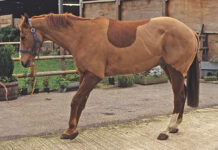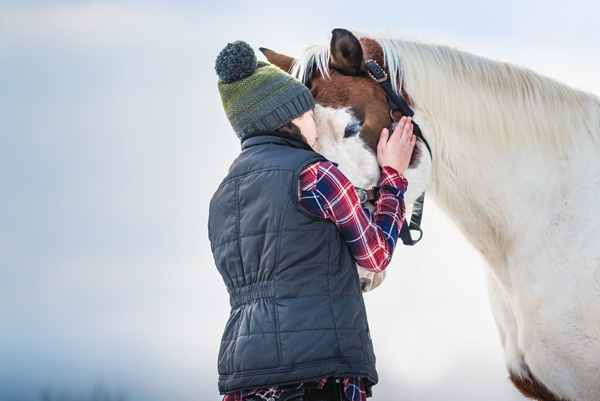
Gloves, thick socks, coat, and a cup of hot chocolate waiting back at the barn—these are four things that show you’re ready for winter riding. But what about your horse? Check these four things to make sure your pony gets the care he needs to stay healthy during the cold winter weather.
1. Blankets and Clipping
 However, there are instances when a horse needs some help. Some horses, due to breed or age, don’t grow very thick coats. These horses will likely need a blanket when the temperatures drop. Likewise, no matter how thick a coat a horse grows, if he gets wet, he will get cold. If your horse is outside in cold weather with precipitation, a blanket will help keep him dry and warm.
However, there are instances when a horse needs some help. Some horses, due to breed or age, don’t grow very thick coats. These horses will likely need a blanket when the temperatures drop. Likewise, no matter how thick a coat a horse grows, if he gets wet, he will get cold. If your horse is outside in cold weather with precipitation, a blanket will help keep him dry and warm.
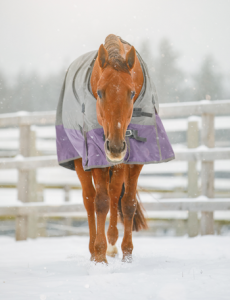
Another consideration is clipping. Although a clipped horse is easier to groom and cool down after winter riding, he will definitely need your help with extra warmth. Clipped horses should wear blankets during cold weather.
If your horse is blanketed, check it regularly to make sure there are no rips and that it’s not rubbing your horse, which could create a sore spot on his skin. Remember to never blanket a horse that is wet or sweaty; wait to blanket him until he’s fully dried out.
2. Diet
A horse’s complex digestive system has many interesting parts, but did you know it also acts as a furnace? The process of digesting the fiber in hay creates internal heat that helps keeps your horse warm in the winter. For this reason, it’s important that your horse has plenty of hay to munch on when it’s cold out.
During the winter, to keep your pony healthy consider increasing the amount of hay you give him, especially if he’s older or outside temperatures fall below 20 degrees F. Even though grain has more calories, it’s best to increase only hay; digesting hay creates more internal heat than digesting grain.
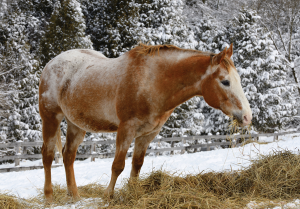
Additionally, if your horse loves his salt block, think about offering him loose salt in a feed pan during the winter. Some horses don’t like licking a frozen salt block.
Probably the most important health advice for winter is to watch your horse’s water intake. Make sure his water bucket and trough are free of ice. Even if the water doesn’t freeze, consider a heated water bucket—studies have shown horses prefer it at least 45 degrees!
Impaction colic is commonly seen in the winter due to horses not drinking enough water. Also remember that most domesticated horses will not eat ice or snow, so they cannot rely on those for water sources in the pasture.
3. Environment
It may be cold out, but try to keep your horse’s stall and the barn as open as possible to allow for ventilation. Horses with respiratory problems, such as heaves, have a particularly hard time in the winter when they are stalled in barns with dusty, stagnant air.
Keep your horse in the field as much as possible in the winter and make sure his stall is cleaned daily to prevent buildup of harmful ammonia levels from urine. When in the pasture, be sure your horse has access to shelter so that he can escape the wind and any rain or snow.
4. Riding
You can definitely still ride when it’s cold out if you the take proper precautions. For example, don’t ride when it’s really icy, or if the snow is particularly deep and wet. This type of snow can be really hard for a horse to move through and can put excess stress on him if he’s not fit enough for such hard work. This type of riding can also lead to tendon or ligament strains.
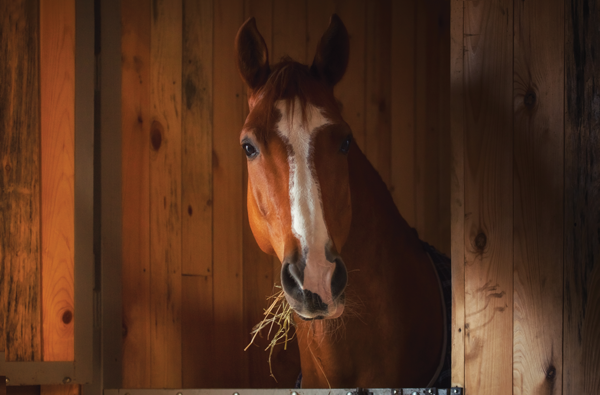
If you plan on riding a lot on snowy trails and outdoor rings, be aware that normal horseshoes don’t have good traction on slick surfaces. Also, hard-packed ice can bruise the soles of your horse’s feet and make him tender-footed. Consider either pulling his shoes or asking your farrier about ice studs or snow pads. These help add traction and prevent ice buildup in the sole.
Maybe the most important thing to remember, though, is light snow can be fun to trek through on horseback. Just don’t forget the hot cocoa and carrot as rewards for you both when you return to the barn!
This article about keeping your pony healthy during winter appeared in the November/December 2019 issue of Young Rider magazine. Click here to subscribe!

